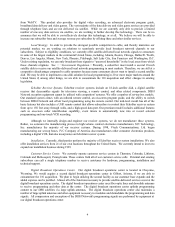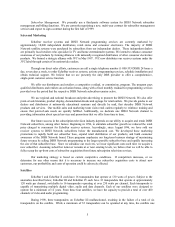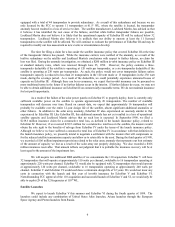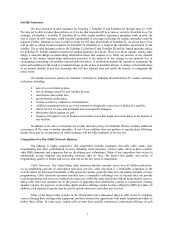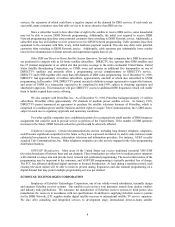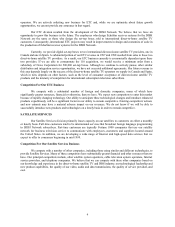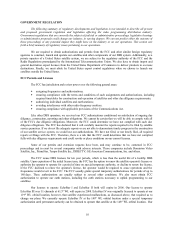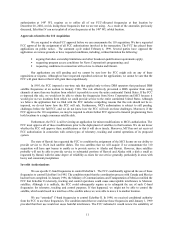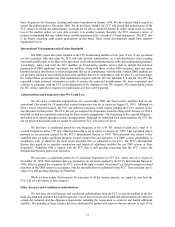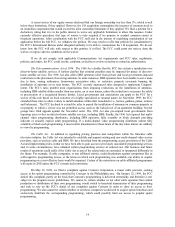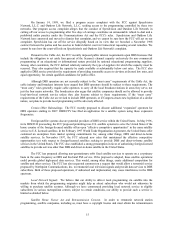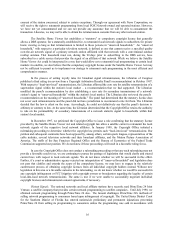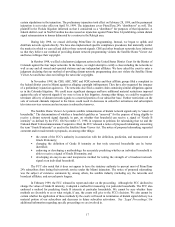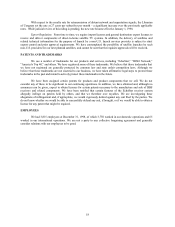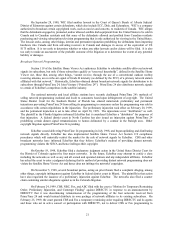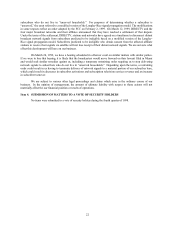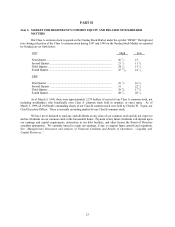Dish Network 1998 Annual Report Download - page 16
Download and view the complete annual report
Please find page 16 of the 1998 Dish Network annual report below. You can navigate through the pages in the report by either clicking on the pages listed below, or by using the keyword search tool below to find specific information within the annual report.14
A recent survey of our equity owners disclosed that our foreign ownership was less than 5%, which is well
below these limitations, if they applied. However, the 110 acquisition contemplates the issuance of common stock to
an Australian corporation that would exceed the alien ownership limitations if they applied. We filed a petition for a
declaratory ruling that it is in the public interest to waive any applicable limitations to allow this issuance. Under
currently effective precedent, that type of waiver is only required if we propose to conduct common carrier or
broadcast operations. After coordination with the FCC staff and in the interest of expediting consideration of our
application before the full FCC, we withdrew the petition. We may need to re-file that petition for consideration by
the FCC’s International Bureau under delegated authority to be able to consummate the 110 acquisition. We do not
know how the FCC will rule with respect to this petition, if re-filed. The FCC could grant our waiver, deny the
waiver, or impose adverse conditions on the waiver.
If we do not comply with applicable Communications Act requirements and FCC rules, regulations,
policies, and orders, the FCC could revoke, condition, or decline to review or decline to extend an authorization.
The Telecommunications Act of 1996. The 1996 Act clarifies that the FCC has exclusive jurisdiction over
direct-to-home satellite services. It further clarifies that criminal penalties may be imposed for piracy of direct-to-
home satellite services. The 1996 Act also offers DBS operators relief from private and local government-imposed
restrictions on the placement of receiving antennas. In some instances, DBS operators have been unable to serve areas
due to laws, zoning ordinances, homeowner association rules, or restrictive property covenants banning the
installation of antennas on or near homes. The FCC recently announced rules designed to implement Congress’
intent. The FCC’s rules prohibit most organizations from imposing restrictions on the installation of antennas,
including DBS satellite dishes smaller than one meter, on or near homes, unless the restriction is necessary for safety
or preservation of a recognized historic district. Local governments and associations can apply to the FCC for a
waiver of this rule based on local concerns of a highly specialized or unusual nature. In November 1998, the FCC
extended these rules to allow renters to install antennas within their leaseholds (i.e., homes, gardens, patios, terraces
and balconies). The FCC declined to extend the rules to permit the installation of antennas on common property or
on property to which a viewer was not permitted access, such as the locked roof of an apartment building. Several
groups have filed appeals against the November order. The 1996 Act also pre-empted local governments from
imposing taxes or fees on direct-to-home satellite services, including DBS. Finally, the 1996 Act required that multi-
channel video programming distributors, including DBS operators, fully scramble or block channels providing
indecent or sexually explicit adult programming. If a multi-channel video programming distributor cannot fully
scramble or block such programming, it must restrict transmission to those hours of the day when minors are unlikely
to view the programming.
The Cable Act. In addition to regulating pricing practices and competition within the franchise cable
television industry, the Cable Act was intended to establish and support existing and new multi-channel video service
providers, such as wireless cable and DBS. We have benefited from the programming access provisions of the Cable
Act and implementing rules, in that we have been able to gain access to previously unavailable programming services
and, in some circumstances, have obtained certain programming services at reduced cost. Our business and future
results of operations could suffer if the Cable Act or any of the related rules are amended, or interpreted differently in
the future. For example, if cable companies, or any affiliated entities, could discriminate against competitors like us
with regard to programming access, or the terms on which such programming was available, our ability to acquire
programming on a cost-effective basis would be impaired. Certain of the restrictions on cable-affiliated programmers
will expire in 2002 unless the FCC extends such restrictions.
On May 19, 1998, we filed a complaint against Comcast Corporation, a major cable provider, seeking
access to the sports programming controlled by Comcast in the Philadelphia area. On January 22, 1999, the FCC
denied this complaint, partly on the basis that Comcast’s programming is delivered terrestrially and therefore is not
subject to the program access prohibitions. We cannot be certain whether or not other cable operators that control
production or distribution of their own programming would switch to terrestrial transmission of their programming
and seek to rely on the FCC’s denial of our complaint against Comcast in order to deny us access to their
programming. We also cannot be certain whether or not these companies would seek to acquire sports franchises and
exclusively distribute the corresponding programming, which could possibly limit our access to popular sports
programming.


